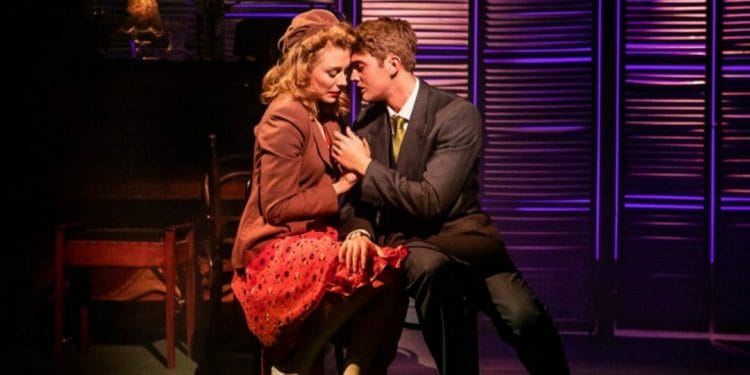 Written between Phantom of the Opera and Sunset Boulevard, the Andrew Lloyd Webber musical Aspects of Love enjoyed a little success in London before struggling through a year on Broadway. There’s a multitude of reasons why this particular Lloyd Webber offering didn’t fare as well as so many of his others, but now nearly a decade since it’s last London revival, the powerhouse of Aria Entertainment and Hope Mill Theatre transfer the show to London following a successful run in Manchester.
Written between Phantom of the Opera and Sunset Boulevard, the Andrew Lloyd Webber musical Aspects of Love enjoyed a little success in London before struggling through a year on Broadway. There’s a multitude of reasons why this particular Lloyd Webber offering didn’t fare as well as so many of his others, but now nearly a decade since it’s last London revival, the powerhouse of Aria Entertainment and Hope Mill Theatre transfer the show to London following a successful run in Manchester.
This sung through musical looks at love, and the many forms it can take, some of those may be a little uncomfortable to watch but they are nevertheless included. Taking place over two decades it follows Alex, who falls in love with struggling actress Rose, the affair is short lived and some years later Alex is surprised to find Rose has moved in with his Uncle George. Despite George offering her back to Alex she instead marries George, welcoming with open arms his Italian lover Giulietta in to the marriage bed.
There’s a lot been packed in and we’ve only reached the interval, come the second act, Rose is now a successful actress with a fifteen-year-old daughter to George, and the odd lover to boot. When Alex returns, he falls in love with his teenage cousin and must wrestle with his conscience on whether an incestuous under-age relationship is the right course of action.
Needless to say this multi-faceted plot makes for an overly long evening of theatre. The only song from Aspects of Love to have really survived in the public conscious is ‘Love Changes Everything’ thanks, in part, to Michael Ball keeping it in the UK charts for some fourteen weeks. Much like ‘Memory’ in Cats, the song is endlessly repeated, shoehorned in at every possible opportunity to lift an otherwise mundane sung through score. It only in the circus scene, and to some extent the later funeral scene that we really get to see any kind of variation on the score, and Sam Spencer-Lane’s choreography is allowed a moment to shine.
With this production, director Jonathan O’Boyle tries hard to remove some of the complexity, stripping it back to one set and accompanied by only three musicians. On one had it makes little difference, there’s only so many times the ensemble can spin a chair around to initiate a scene change before your reminded again of the clunky plot. But in some ways, it makes all the difference; the staging feels far more intimate and even accessible, while the songs feel more natural and less laboured than in the normal sung-through set up.
Jason Denvir’s louvre door backdrop allows the action to move from café, to villa with a stop at the theatre or train station in between. It works exceptionally well, and Aaron J Dootson’s lighting design cements the look and feel.
While the source material has many flaws, it is the cast in this production which allows you to see beyond the weaknesses and revel in the accomplished performances. Kelly Price does wonders with the role of Rose Vibert, adapting the style of delivery to fit as the character ages, and delivering a show stopper in the form of ‘Anything But Lonely’. Madalena Alberto makes Giulietta so much more than the stereotypical Italian lover the character was written to be, her subtle and tender delivery is a joy, and her rendition of ‘There is More to Love’ was perhaps the highlight of the evening.
Casting off any shadows of Michael Ball, Felix Mosse is superb as Alex Dillingham, his gentle voice finds the power when needed. Mosse also succeeds in portraying the agony that the character feels as his love life takes successive blows, a truly remarkable performance indeed.
Many of the original flaws remain; an overly complicated plot with a persistent score, and a collection of characters who are difficult to empathise with, doesn’t make for an easy starting point. But the creative team have managed to find some salvation in this stripped back, but impressive looking revival. They may not have changed everything, but they have perhaps rekindled the love for this musical in a new generation.























